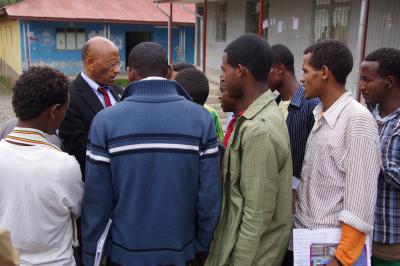NMSU builds partnerships to benefit students, researchers 8,000 miles away

Today, Adera is dean of New Mexico State University's College of Health and Social Services, 8,000 miles away from his native Ethiopia. Now in academia, Adera visits his home country once each year, trying to give back and to ensure others are given the same opportunity he had to succeed.
Years ago, Adera received a call from a pastor in Ethiopia who needed help building a community center badly needed in Adera's home of Debre Birhan. The center's goal was to provide basic services for the community, including assisting children whose parents had died from HIV and AIDS. Adera and his wife donated to the cause, and Adera himself began making his now regular trips back to Ethiopia.
In the spring of 2012, Adera led a team of NMSU researchers to Ethiopia in an effort to form educational partnerships in the fields of water resources, water management and health. The team included Ricardo Jacquez, dean of NMSU's College of Engineering; Kathleen Hales, professor in the Southern New Mexico Residency Program; Sam Fernald, professor in animal and range sciences; and Frank Ward, professor in agricultural economics and agricultural business.
"To me, Ethiopia is the gateway to Africa," Adera said. "As poor as the country is, Ethiopia is one of the fastest growing economies in the world. A complete transformation is taking place all over Africa. A sleeping giant is just now waking up and is ready for business."
Adera knows much about transformation. His mother never knew how to read or write. His father had the equivalent of a 4th grade education. If a letter was sent to the village where they once lived, the townspeople had to take it to a priest to find out what it said. Then, at the age of six, Adera's life changed completely. His father joined the army, and his entire family was whisked away from their small farming village to a city with basic infrastructure, running water and access to education. Now, Adera wants to make sure others have access to those same resources.
"These partnerships can be mutually beneficial for students, researchers and universities in both countries," Adera said. "In teaming with Ethiopian universities, NMSU has a much better chance of securing various research grants. Student and faculty exchanges between the countries can also help everyone gain experience."
During his most recent trip, Adera spoke at the 13th World Congress of Public Health in Addis Ababa about the benefits of building survey research centers in developing countries to measure the extent of diseases and the effectiveness of prevention programs. During that time, the NMSU team also had an opportunity to network with the thousands of international researchers in attendance.
An area of significant importance for both Ethiopia and Southern New Mexico is water. Often referred to as the "water tower" of Eastern Africa, Ethiopia's fourteen major rivers, including the Nile, pour off its high tableland. To date, little research has been done on these rivers and little infrastructure is in place in Ethiopia to harness its water for irrigation and hydroelectric power. Adera believes NMSU researchers have an opportunity to gain world renown by partnering with Ethiopian universities on these efforts.
"The Africa we know now will not be the same in 25 years," Adera said. "They are becoming more competitive in all sectors. When I went to college, there was one university in the entire country of Ethiopia. Now there are 35. We have a chance to partner with them just as they are in need of more professionals in higher education."
Adera also believes these efforts can help others in his home country have a better life, free from hunger and disease. That, in turn, would help others to have more opportunities for success and perhaps allow someone else growing up in Ethiopia to become a dean at an American university.
"I have learned that one person's decision can have a far-reaching impact on the future of an entire generation," Adera said. "I've been very fortunate. I know I don't deserve all of what I've received in this life. I hope these efforts help others, too."


